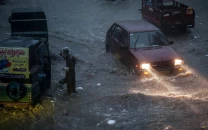23 Afghan journalists pack up and leave
A Nai finding suggests the Afghan media now faces nearly 72% censorship that poses a serious threat to their freedom

PHOTO: AFP
The journalists left the country primarily due to insecurity, and pressure from the government, powerful armed groups, the Taliban, and official censorship, according to the Nai media group that supports open media in Afghanistan.
Nai’s Executive Director Abdulmujeeb Khalwatgar said that media professionals, including photographers, were working with different media outlets, and fled the country en masse late Sunday. Nai did not reveal their names but confirmed the journalists had informed the group about their step.
The Afghan media says this is the first time in the country’s history that nearly two dozen media professionals have left the country en masse. Among other reasons, the group listed lack of job security and uncertain future for media workers in Afghanistan. “This is a serious setback for the media and freedom of expression. The government should take action to address the looming crisis for the media,” it added.
A Nai finding suggests the Afghan media now faces nearly 72% censorship that poses a serious threat to freedom of the press. About 300 media professionals interviewed during a survey conducted in Afghanistan’s 25 provinces said censorship poses a serious challenge to freedom of expression. In Kabul, only two of 58 journalists interviewed said there was no censorship
Giving a break-up, the journalists said the government censorship stands at 48%, local powerful groups 46% and the rest is by the Taliban or self-censorship. The government censors news related to the security agencies, including army, says the survey.
Nai said in a recent statement that the current condition has impacted the media as 75 outlets have shut down their business in different parts of the country while more media outlets are on the edge of closing down.
The group says the security agencies had summoned several journalists for questioning this month triggering concerns among the community. “Illegal summoning and investigation of correspondents and writers ordered by the National Security Council without having documents in hands has created fears among the correspondents and media professionals,” Nai had said after the journalists were quizzed.
Two correspondents, who had criticised the government’s performance on the ‘Kabul Taxi’ page of social networking site Facebook, had been summoned for questioning for their actions. “Any illegal summons or conscription of the correspondents without legal documents by the security, justice and judicial departments are contrary to mass media laws, and an infringement on freedom of speech,” Nai said on its website.
Published in The Express Tribune, September 15th, 2015.



















COMMENTS
Comments are moderated and generally will be posted if they are on-topic and not abusive.
For more information, please see our Comments FAQ